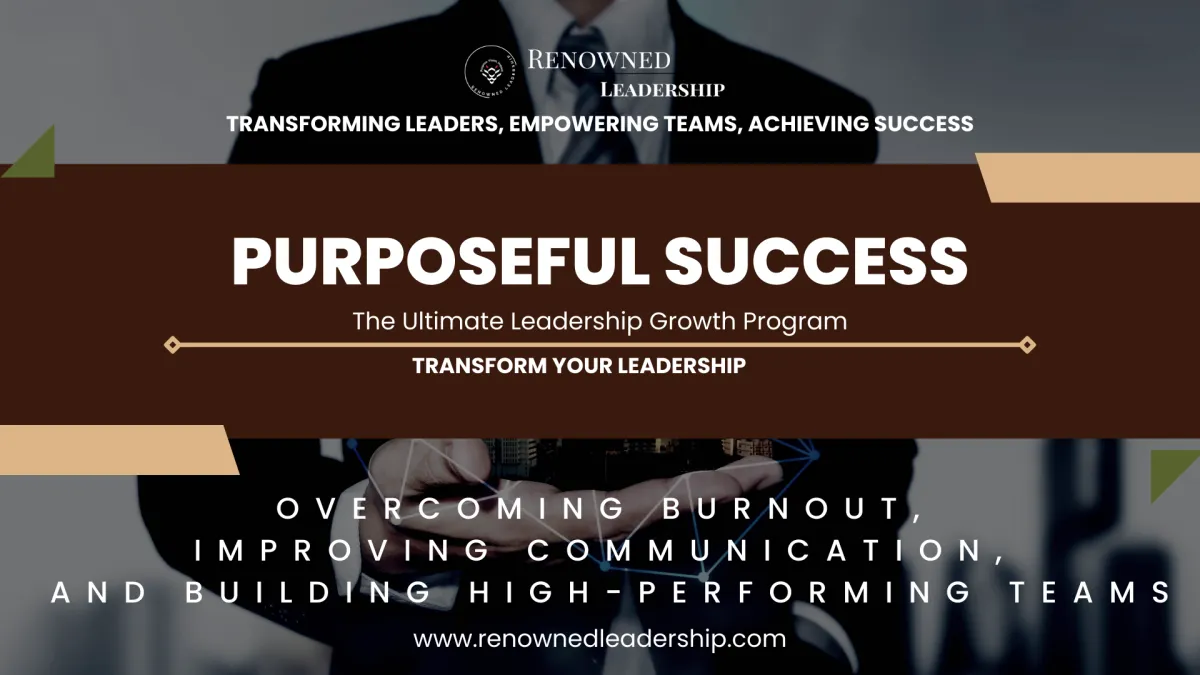Elevate Your Leadership
At Renowned Leadership, we provide you with the tools and strategies to build elite, high-performing teams through the 3 C's of leadership: Community, Consistency, and Clarity. Our personalized coaching helps you enhance communication, foster a positive work environment, and achieve sustainable success.
Elevate Your Team

We believe in the transformative power of our Purposeful Success program. That's why we offer a 14-day money-back guarantee. If you're not completely satisfied with our coaching, simply let us know within 14 days, and we'll refund your money – no questions asked.
Conquer Burnout
and Lead with Confidence
At Renowned Leadership, we help you overcome burnout, enhance communication, and foster a positive work environment. Our tailored strategies and tools are designed to transform your leadership approach.
Empower yourself to lead effectively and build cohesive teams.

Foster a Strong Community
Ensure Consistent Leadership
Gain Clarity in Your Vision

What Our Clients Say
"My coaching with Stephen has been so impactful to me personally because of how holistic it has been. Not only have I learned and grown in the areas I hired Stephen for with my business, but I've also learned to grow as a person through his mentorship and the way his coaching program forced me to take a hard look in the mirror first." Andrew S.

What Our Clients Say
"My coaching with Stephen has been so impactful to me personally because of how holistic it has been. Not only have I learned and grown in the areas I hired Stephen for with my business, but I've also learned to grow as a person through his mentorship and the way his coaching program forced me to take a hard look in the mirror first."
Andrew S.

Harness the Power of Community, Consistency, and Clarity to Drive Success
At Renowned Leadership, we provide you with the tools and strategies to build elite, high-performing teams through the 3 C's of leadership
Community:
Build strong connections to foster a supportive environment.
Consistency:
Develop reliable habits and actions to inspire confidence.
Clarity:
Understand your goals
and articulate them effectively to lead with impact.

Our Promise to You
We are committed to guiding individuals who face leadership challenges such as burnout, poor communication, and team cohesion issues. With our expertise and personalized approach, we'll help you unlock your full potential and lead with integrity. Empower yourself to achieve lasting success in your personal and professional life.
Unlock Your Potential
Struggling with challenges such as burnout, communication barriers, or team cohesion issues?
Identify Your Challenges: Understand and address your specific pain points.
Set Clear Goals: Establish actionable objectives to guide your progress.
Receive Expert Guidance: Get personalized advice tailored to your needs.
Transform Your Life: Implement strategies that drive lasting success and high-performing teams.
The Resilient Leader

Cultivating Integrity in Leadership: The Role of Effective Communication
“Leaders should communicate not only what decisions are made but also why they are made, explaining the rationale and the expected outcomes.” - Corinne Hammond
Image: Freepik
Introduction:
In today's fast-paced and complex business environment, integrity stands as a cornerstone of successful leadership. For entrepreneurs and corporate leaders alike, maintaining a high standard of ethical behavior not only enhances personal reputation but also fosters a positive organizational culture. Effective communication plays a crucial role in this process, serving as the bridge between aspirational values and practical application. This article explores the pivotal ways leaders can cultivate integrity through strategic communication, ensuring their actions consistently reflect their core values.

Set an Ethical Standard
Leadership begins with setting an example. Demonstrating integrity in every action and decision sets a high standard for ethical behavior that inspires others to follow. When leaders consistently make choices that align with ethical principles, regardless of the potential for personal or organizational gain, they establish a clear benchmark for everyone within the organization. This transparency fosters respect and encourages a collective commitment to uphold similar standards, reinforcing a foundation of trust.
Articulate Core Values
A key aspect of leadership is the ability to clearly articulate the organization's core values and ethical principles. This communication must be unequivocal and pervasive, permeating every level of the organization. When leaders explicitly state what the company stands for, it eliminates ambiguity and helps employees and stakeholders understand the behaviors that are expected of them. This clarity is essential for aligning the organization’s practices with its declared values, fostering a unified approach to ethics across the business.
Open Dialogue on Decision-Making
Transparency in the decision-making process is vital for cultivating trust within an organization. Leaders should communicate not only what decisions are made but also why they are made, explaining the rationale and the expected outcomes. This openness helps employees and stakeholders understand the complexities involved in decisions and reassures them that these choices are made with integrity. Such practices not only promote trust but also encourage a culture of accountability, where leaders are expected to justify their decisions based on ethical considerations.
Seek Specialized Training and Workshops
Leadership challenges are an inevitable part of managing any organization. Attending targeted workshops or executive presence training sessions is crucial for preparing leaders to tackle these issues effectively. These sessions, focused on enhancing executive presence, help leaders develop the confidence and clarity needed to communicate effectively in various situations. Through role-playing, personalized coaching, and feedback, leaders can refine their ability to engage and influence their teams and stakeholders. Such training equips them with the tools to project authority and authenticity, ensuring their leadership is both impactful and respected across the organization.
Empower Ethical Advocacy
Creating an environment where employees feel safe to raise concerns about unethical behavior is crucial for maintaining an ethical workplace. Leaders must establish and enforce clear policies that protect whistleblowers from retaliation. By doing so, they uphold a culture of integrity and empower employees to act as watchdogs for ethical breaches. This environment encourages everyone within the organization to become an active participant in maintaining ethical standards, significantly reducing the risk of misconduct.
Align Words with Actions
Consistency is key in ethical leadership. There must be no discrepancy between what leaders say and what they do. Inconsistencies can send mixed signals to employees, potentially undermining the trust and credibility of leadership. When leaders ensure their words and actions are aligned, they set a clear and reliable example, reducing confusion and boosting morale across the organization. By maintaining this consistency, leaders not only reinforce the importance of integrity but also effectively model the behavior they expect from others.
Engage Stakeholders
Regular engagement with stakeholders is essential for ethical leadership. By actively soliciting feedback and addressing concerns, leaders can demonstrate their commitment to not only running a profitable business but also operating in an ethically sound manner. This engagement helps leaders understand the impact of their business decisions on various stakeholders, including employees, customers, suppliers, and the community at large, fostering a more holistic approach to ethical leadership.
Cultivating integrity in leadership through effective communication is not just about sending the right message — it's about fostering a culture where ethical considerations are at the forefront of every decision. By setting a personal example, articulating core values, engaging in executive presence training, and openly communicating with employees and stakeholders, leaders can build a robust ethical framework that enhances organizational success and reputation. As integrity becomes increasingly recognized as a critical asset in business, the role of effective communication in its cultivation cannot be overstated.
Step up your leadership game with Renowned Leadership—book a personalized coaching consultation and unlock your full potential!
What Our Clients Say

Marcus K.
" I wanted to thank you once again for helping me thru the process of identifying the best place for my team. I truly appreciate you advice and feedback! "

Rebecca W.
"Renowned knows leadership and leadership training inside and out."

KC
"Stephen's coaching, guidance, and expertise in leadership development have helped me become more productive, effective, and fulfilled."
Insights and Strategies for Effective Leadership
Discover the latest trends and insights in leadership.
Read our blog for practical advice and strategies to enhance your leadership skills.
We respect your privacy. Your information is safe with us and will never be shared. By submitting your email, you agree to receive occasional updates and valuable resources from us. You can unsubscribe at any time.

© 2024 Renowned Leadership LLC


